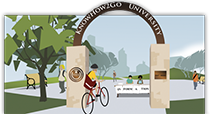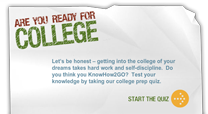Get Ready
Getting ready for college is about setting your mind to do it. You know you're college material. You've got big dreams. You've got what it takes.
Once you set your mind to it, you've got to stay in school, take the tough classes and learn about standardized tests. Use the following sections to learn more and don't forget to take a college tour!
Stay in School
Over a lifetime, a high school dropout working full-time will earn $300,000 less than a high school graduate, and more than $1 million less than a college graduate. It's easy to see that if you want to do well, graduating is what you've got to do first. Here are a few more good reasons why you should stay in school:
Reason 1
High school dropouts are four times more likely than college graduates to be unemployed.
Reason 2
Graduating from high school will most likely determine how well you live for the rest of your life.
Reason 3
On average, high school graduates earn $175 more per week than high school dropouts. College graduates earn $368 more per week than high school graduates.
The Big Lesson Here?
You've got a lot to lose by giving up, and everything to gain by being serious about school.
English
Four or more years (grammar, composition, literature, etc.)
Mathematics
Three or more years (Algebra I and higher - does not include general math, business math or consumer math)
Natural Sciences
Three or more years (earth science, biology, chemistry, physics, etc.)
Social Sciences
Three or more years (history, economics, geography, civics, psychology, etc.)
Additional Courses
Some colleges and universities require other classes as prerequisites for admission, such as two or more years of the same foreign language or courses in the visual arts (music, theater, drama, dance, computer science, etc.)
Standardized Tests
Their names can sometimes sound like alphabet soup, but the standardized tests you will take in high school are important for college. Some schools require different tests, so you want to make sure to check with each about their requirements. Here are the four main tests you may have to take if you want to apply to most colleges:
PLAN
The PLAN is the pre-ACT test taken by 10th graders to help them estimate how well they'll do on the ACT. It's a comprehensive guidance resource that helps students measure their current academic development, explore career/training options and make plans for the remaining years of high school and post-graduation years. Talk to your school counselor for more information about PLAN.
ACT
This standardized test is designed to assess high school students' general educational development and their ability to complete college-level work. It often is used for college admission decisions, and virtually all U.S. colleges and universities accept ACT results. The ACT consists of four multiple-choice tests in English, mathematics, reading and science, as well as an optional writing test.
PSAT
The PSAT (Preliminary SAT) is a two-part exam that is very similar to the SAT. The PSAT consists of two 25-minute verbal sections, two 25-minute math sections and one 30-minute writing skills section. Most people take the PSAT in the fall of their junior year in high school. Some students choose to take it during their sophomore year. Scores on the PSAT are used to determine National Merit Scholars, students who qualify for merit-based scholarships distributed throughout the United States. Talk to your school counselor for more information.
SAT
The SAT is one of two standardized tests used by colleges as part of their admissions requirements. The SAT I is a three-hour exam that measures verbal and math reasoning skills used for admission. Scores on each section range from 200-800 points. The SAT II consists of more than 20 subject areas, or achievement tests designed to measure subject-area knowledge.
Visit the Campus
No matter how many brochures you read or websites you visit, nothing tells you more about a college than visiting its campus in person. Plus, you can learn a lot more just by asking questions. Here's a list to get you started.
Ask Your College Host:
- What activities and services are available to help students get settled (academically and socially) during their first year?
- How big are the classes?
- What is the total cost of attending the college?
- What types of financial aid does the college offer and how do I apply?
- Are all freshmen assigned to an academic advisor?
- Where do most freshmen live?
- Can I take a tour?
- What activities are available for students?
- Who teaches the courses for first-year students?
- How successful are the college's graduates in finding jobs?
- What services (such as transportation and shopping) are available locally?
Ask Any Students You Meet:
- How easy is it to meet with faculty?
- Are you able to register for the classes you want?
- What is there to do on weekends? Do most students stay or leave campus on weekends?
Applying
Completing college applications can take a lot of time. So you want to make sure that you get it right the first time. Here are some tips to guide you through the process:
Know the Guidelines
Before you start applying to schools, find out the application deadline and fees for each school you are considering.
Plan Ahead
It takes time to get standardized test scores tabulated and mailed, and it takes time for school counselors and others providing references to gather information.
Follow the Instructions and Proofread
The application is often a college admission committee's first contact with you. Make a good impression with a neat application free of spelling and grammatical errors.
Work with Your High School
Go to your school counselor for help getting all necessary transcripts (grade history), test scores and applications sent to prospective schools. If you decide to apply to schools that have not already received your test scores, you can ask to send your scores to that college.
Make the Most of Personal References
Ask people who know you well, and who will give the best impression of you to your school. Prepare a neat and legible reference form and give your references plenty of time to respond.
Write an Outstanding Essay
Most college applications require an essay, so spend time developing a good one. While a great essay probably won't get you into college if you don't meet the other academic requirements, it could move you from a "maybe" to a "yes."
Be Ready to Interview, Audition or Submit a Portfolio
Some colleges also require a personal interview or examples of work in special areas such as art or music.
Keep a Copy of All Application Materials
You never know when you might need them again!





